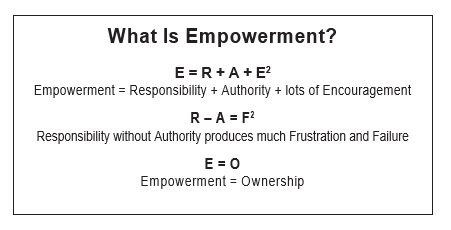7 Ways to Share Power
Exemplary leaders accomplish great things by enabling others to take ownership of and responsibility for the organization’s success.
Malcolm Webber


1. Give power away. Paradoxically, leaders become more powerful when they give their own power away. Leadership power is not a fixed and limited sum – like a pie that is divided into pieces – to be hoarded and grudgingly divided up only when absolutely necessary. Everyone benefits when a leader gives power away. No one loses – especially not the leader! A leader’s power is not reduced when he empowers others. Organizationally, power actually consolidates and multiplies when it is shared with others. When people have responsibility and genuine influence, their commitment to the organization and its success drastically increases. The key to unleashing an organization’s potential to excel is putting the power in the hands of the people who perform the work. Thus, leaders must trust and respect their constituents, and they must know their people well enough to empower them appropriately. Jesus is our ultimate Model for this (Matt. 10:1; Mark 16:15-20).
2. Facilitate decision-making authority. Good leaders will enlarge their constituents’ spheres of influence, and will provide them with greater decision-making authority and responsibility. They will remove or reduce unnecessary approval steps, eliminate as many rules as possible, increase people’s flexibility regarding processes, support the exercise of independent judgment, encourage creative solutions to problems, define jobs more broadly (as projects, not tasks), provide the resources necessary for success, and support freedom of organizational communication (both vertically and horizontally).
3. Develop competence. If people are to succeed in their new and increasing responsibilities, they need to develop their capacities. Leaders must invest in developing their people’s skills and competencies.
4. Assign critical tasks. Jesus did this in Matthew 28. People’s increased sphere of influence ought to involve something relevant to the most pressing concerns and core issues of the organization. We do our best when our work is critical to success. Empowerment should be genuinely significant and not merely a token acquiescence to the latest management fad. Moreover, leaders should regularly inform their constituents regarding the organization’s performance and the evolving challenges it faces.
5. Stretch them. When giving a new assignment to an emerging leader, determine what you think his capacities are. Then give him an assignment a little more than that. Do not make it too high, or else he will fail and be discouraged. But if you make it beneath his capacities, he will also be discouraged by the lack of challenge. If you give him an assignment equal to his capacities he will soon master it and become bored. Go a little higher, and then let him surprise you! Because it is a challenge he will look to God for success and then rise to his full potential with God’s help; the resulting success will strengthen his faith and establish his confidence in moving ahead into even greater challenges. This is how we help people grow – not by playing it safe, but by challenging them!
6. Offer visible support. It is who you know that counts. Leaders should assist their people in making connections and building strong relationships with others who can help them accomplish their tasks – both inside and outside the church or ministry. Facilitating this networking is empowering. Also, by making visible heroes and heroines of others, a leader will increase those people’s power as well as build a stronger bond between himself and them.
7. Believe in your people. Researchers call this the “Pygmalion Effect.” When a leader genuinely expects his people to do well, they will. Stretch those around you. Give them more than what you think they’re capable of. Moreover, speak life to them, not death. Speak faith and encouragement!
-
- Failure to plan. To simply recruit someone at the last moment to do something is “dumping,” not delegating. The leader must think ahead, communicate thoroughly and commit to an effective ongoing oversight.
- Pride. Of course, we all know that no one else could ever do the job as well as we can! However, the example of Jesus instructs us – He was not too proud to give power away! If Jesus could give power away, then we are not indispensable!
- Lack of vision. If our vision is limited to our existing four walls, then we will see no need to expand the leadership base. However, if we have a vision for growth and impact, then we know that growth requires leader development and empowerment. Pyramids are made tall by widening their foundations. Spectators become critics; participants become partners.
-
- Everyone avoids burnout.(Ex. 18:17-23)
- Everyone can focus on what they’re called to do and are actually good at. (Acts 6:2-4; Rom. 12:6-8)
- We will build leaders. This is one of the key ways in which leaders are built – through accepting responsibilities and “challenging assignments.”(Mark 3:14-15)
- The ministry multiplies. As D.L. Moody said, “It’s better to get ten men to do the work than to do the work of ten men!”(Lev. 26:8)
- God has commanded us to give power away! (Eph. 4:11-13)

